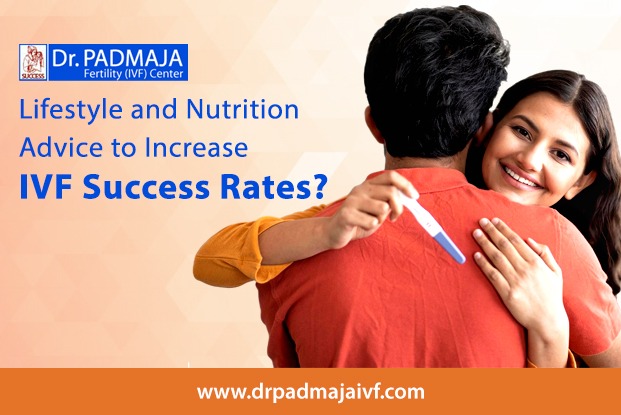In vitro fertilization (IVF) is a remarkable medical advancement that has brought hope to many couples struggling with infertility. However, IVF success doesn’t solely rely on medical procedures and technology. A balanced lifestyle and proper nutrition can play a significant role in increasing IVF success rates. In this blog, we will explore lifestyle and nutrition tips that can help improve your chances of success, especially for those seeking fertility support from the best IVF center in Hyderabad or renowned specialists like Dr. Padmaja IVF Center.
The Importance of a Healthy Lifestyle in IVF Success
Maintain a Healthy Weight
Body weight has a crucial impact on fertility. Both underweight and overweight individuals may face difficulties in conceiving naturally and through IVF. Excess body fat can cause hormonal imbalances, while being underweight may affect ovulation and egg quality. Couples planning IVF should aim for a healthy body mass index (BMI), which typically ranges from 18.5 to 24.9.
The Dr. Padmaja IVF Center in Hyderabad emphasizes the importance of managing weight for IVF success. If you’re struggling with weight management, it’s essential to consult with an expert to design a sustainable plan that works for your body and fertility goals.
Exercise Regularly
Regular physical activity enhances overall health and promotes better blood circulation to the reproductive organs, supporting fertility. However, it’s important to maintain a balance. Over-exercising or excessive intensity can disrupt hormonal levels and negatively affect fertility. Moderate activities such as walking, swimming, and yoga are beneficial for women and men undergoing IVF treatment.
Dr. Padmaja Fertility Center advises incorporating gentle exercise into your routine to help reduce stress and improve circulation. Yoga, in particular, has been shown to reduce anxiety and promote a sense of well-being, which can support the mental and physical demands of IVF.
Reduce Stress
Stress is often considered one of the major contributors to infertility. High levels of stress can negatively affect hormone levels and reduce the chances of a successful pregnancy, whether through natural conception or IVF.
To manage stress, try engaging in relaxation practices such as meditation, deep breathing, and mindfulness. Taking time to relax and unwind can improve your emotional health, which directly impacts fertility.
Nutrition for IVF Success
What you eat before and during IVF treatment plays a significant role in improving your chances of success. Proper nutrition helps optimize hormone function, egg and sperm quality, and overall fertility. Here are some dietary recommendations:
Increase Intake of Antioxidant-Rich Foods
Antioxidants, found in fruits and vegetables, help reduce oxidative stress, which can damage eggs and sperm. Berries, leafy greens, and nuts are rich in antioxidants and can help improve fertility by supporting egg and sperm health.
The best IVF center in Hyderabad often recommends focusing on a colorful and nutrient-dense diet to nourish your reproductive system.
Add Healthy Fats to Your Diet
Healthy fats, such as omega-3 fatty acids found in fish like salmon, flaxseeds, and walnuts, help regulate hormone levels and support egg and sperm health. Including these fats in your diet can improve ovulation and increase the chances of IVF success.
Avoid trans fats and limit processed foods, as these can negatively impact fertility.
Consume High-Quality Protein
Protein plays a significant role in hormone production and overall fertility. Opt for high-quality protein sources such as lean meats, eggs, beans, and legumes. Studies have shown that consuming plant-based proteins can positively influence fertility, so it’s a good idea to add more vegetarian protein sources to your diet.
Folate and Vitamins
Folate (or folic acid) is essential for healthy egg production and embryo development. Make sure you’re consuming enough folate by eating leafy greens, legumes, and fortified cereals. Additionally, ensure you’re getting enough Vitamin D and Vitamin E, which support reproductive health and enhance fertility outcomes.
Stay Hydrated
Proper hydration is key to overall health and helps maintain the fluid balance in your reproductive organs. Drinking sufficient water throughout the day helps in the transportation of nutrients, supports detoxification, and keeps the body’s systems functioning optimally.
Avoiding Harmful Habits
Quit Smoking
Smoking is one of the most significant lifestyle factors negatively affecting fertility. Smoking harms egg quality and can reduce the chances of a successful IVF cycle. Both men and women should avoid smoking during the IVF process.
Limit Alcohol and Caffeine Intake
Excessive alcohol consumption and high levels of caffeine can negatively affect fertility. It’s advised to limit these substances to improve the chances of IVF success. Moderation is key.
Avoid Environmental Toxins
Exposure to environmental toxins, such as pesticides, chemicals, and pollutants, can reduce fertility. Try to limit exposure to harmful chemicals by choosing organic foods and using natural household products.
Consult the Experts at Dr. Padmaja IVF Center
When considering IVF treatment, it’s essential to have a holistic approach, combining medical expertise with lifestyle and nutrition adjustments. For those in Hyderabad, seeking guidance from the Dr. Padmaja IVF Center can provide invaluable support. With years of experience in IVF treatment, the team at Dr. Padmaja Fertility Center helps patients navigate every aspect of IVF, from medical interventions to lifestyle recommendations that promote better fertility outcomes. By focusing on a healthy lifestyle, proper nutrition, and reducing harmful habits, you can significantly improve your chances of IVF success. Always remember that every individual’s fertility journey is unique, and it’s essential to work closely with your fertility expert to create a personalized plan that fits your needs.
Frequently Asked Questions (FAQs)
1.What lifestyle changes can improve IVF success rates?
Adopting a healthy lifestyle, such as regular exercise, managing stress, and maintaining a healthy weight, can improve IVF outcomes. Avoiding smoking, limiting alcohol intake, and reducing exposure to toxins are also important steps.
2.How does diet affect IVF success?
A balanced diet rich in nutrients can enhance fertility. Focus on foods high in antioxidants (like berries, leafy greens), healthy fats (like avocados and olive oil), and lean proteins (such as chicken, fish, and legumes). Avoid processed foods, excess sugar, and trans fats.
3.Should I take supplements during IVF?
Many fertility specialists recommend supplements like folic acid, vitamin D, and omega-3 fatty acids to support IVF success. It’s essential to consult with your doctor to determine the right supplements for your specific needs.
4.Is exercise important during IVF treatment?
Regular, moderate exercise, such as walking or swimming, is beneficial for maintaining a healthy body. However, extreme exercise (e.g., heavy weightlifting) should be avoided as it can negatively affect reproductive health.
5.Can stress affect IVF success rates?
High stress levels can negatively impact fertility and IVF outcomes. Practicing relaxation techniques like yoga, meditation, or deep breathing exercises can help reduce stress and promote a healthier environment for conception.
About the Author

This blog is penned by a devoted content specialist passionate about raising awareness around fertility treatments and emotional well- being. With in- depth disquisition on motifs like IVF and fertility, the thing is to give precious perceptivity for couples on their trip to parenthood.

